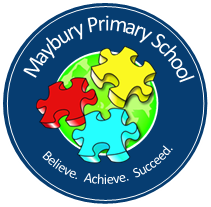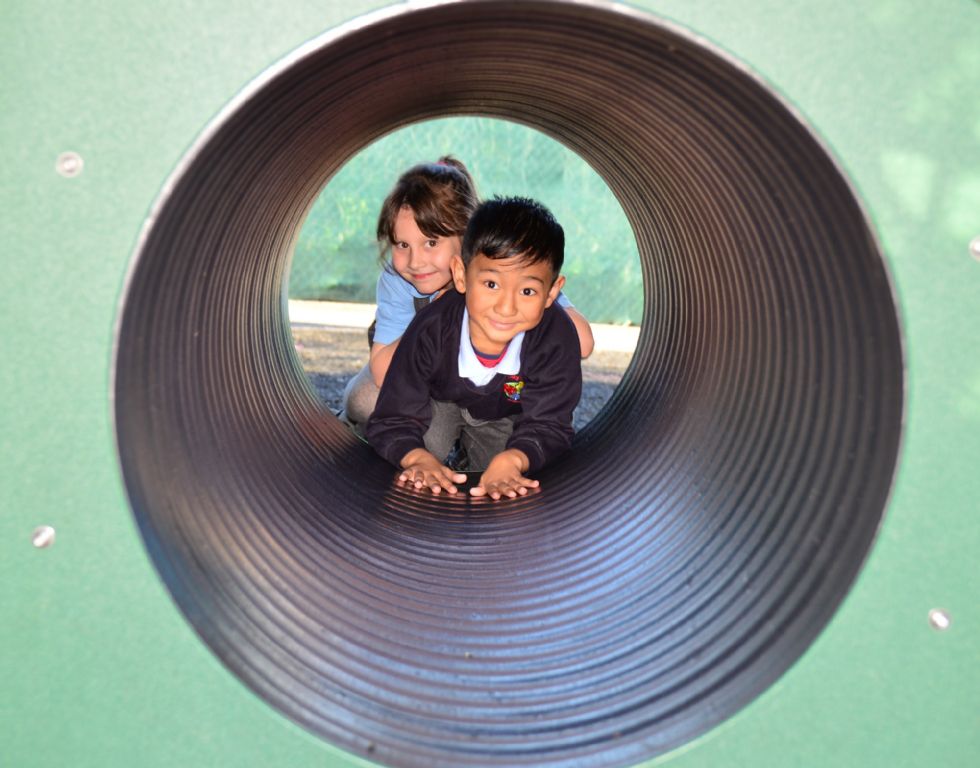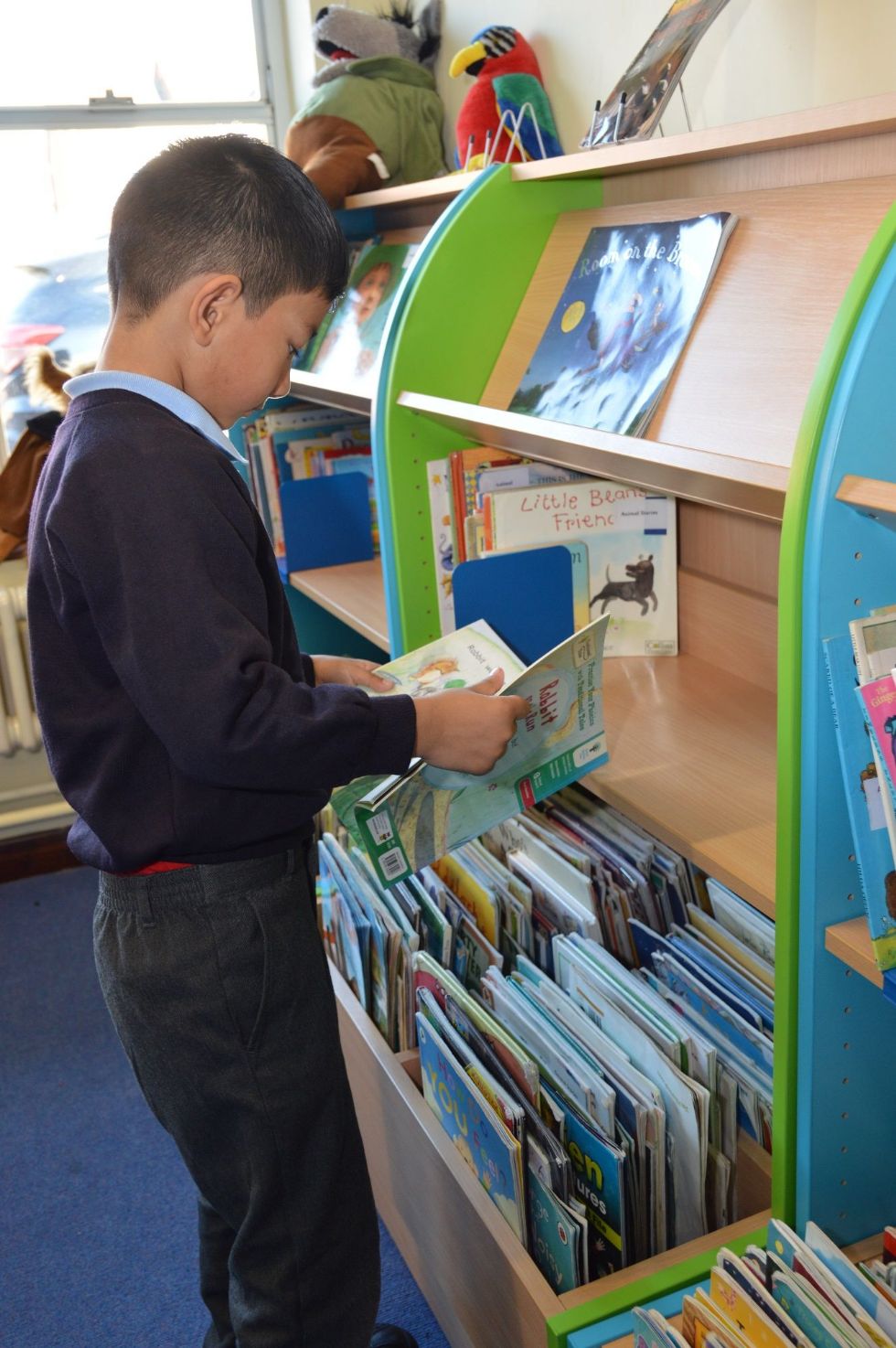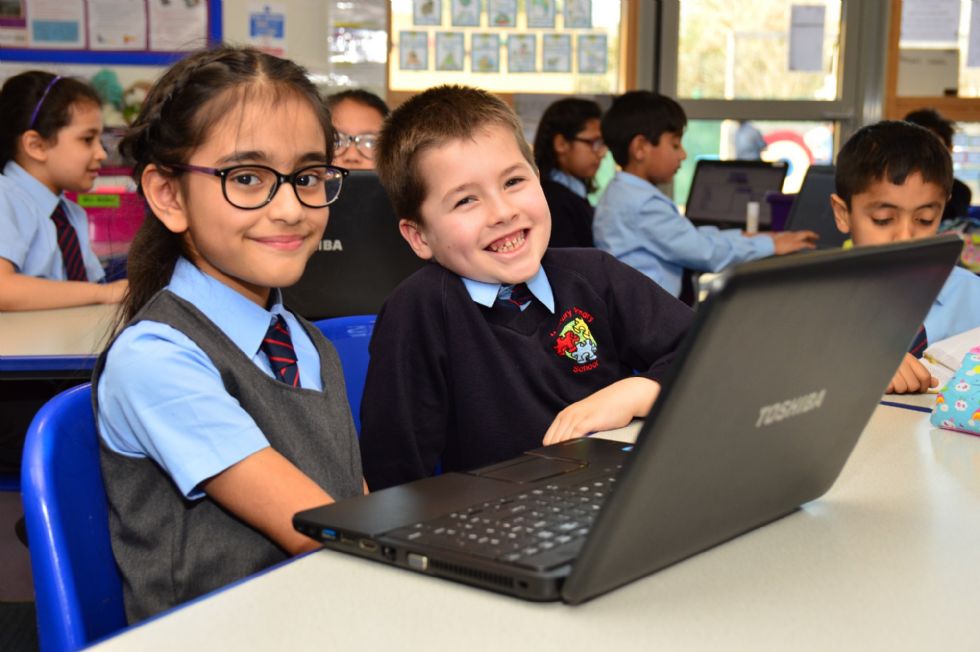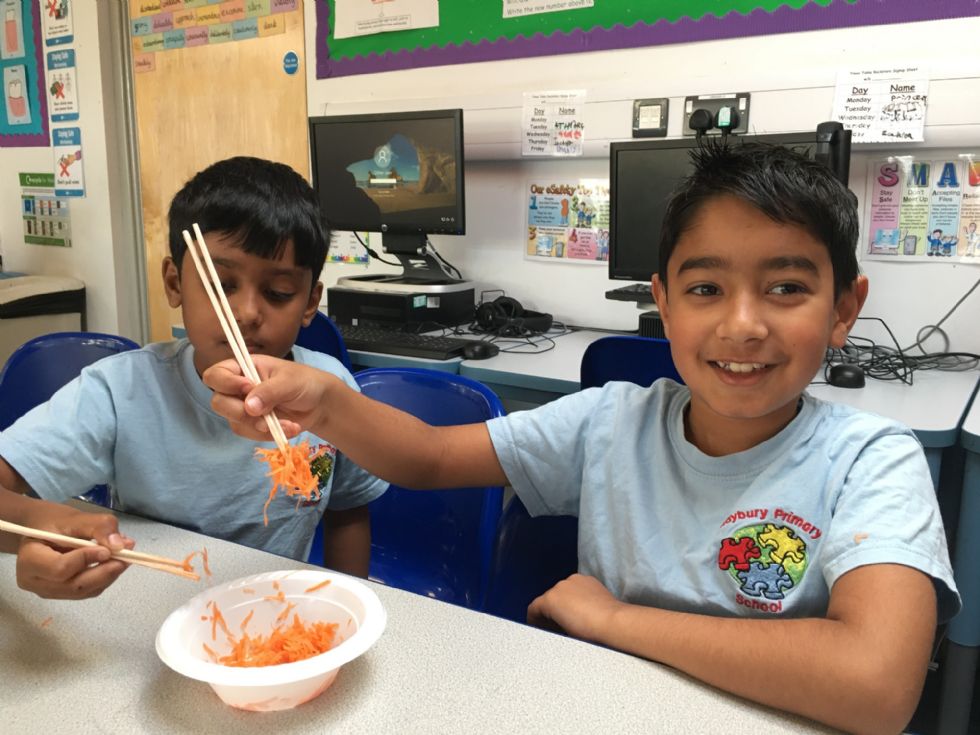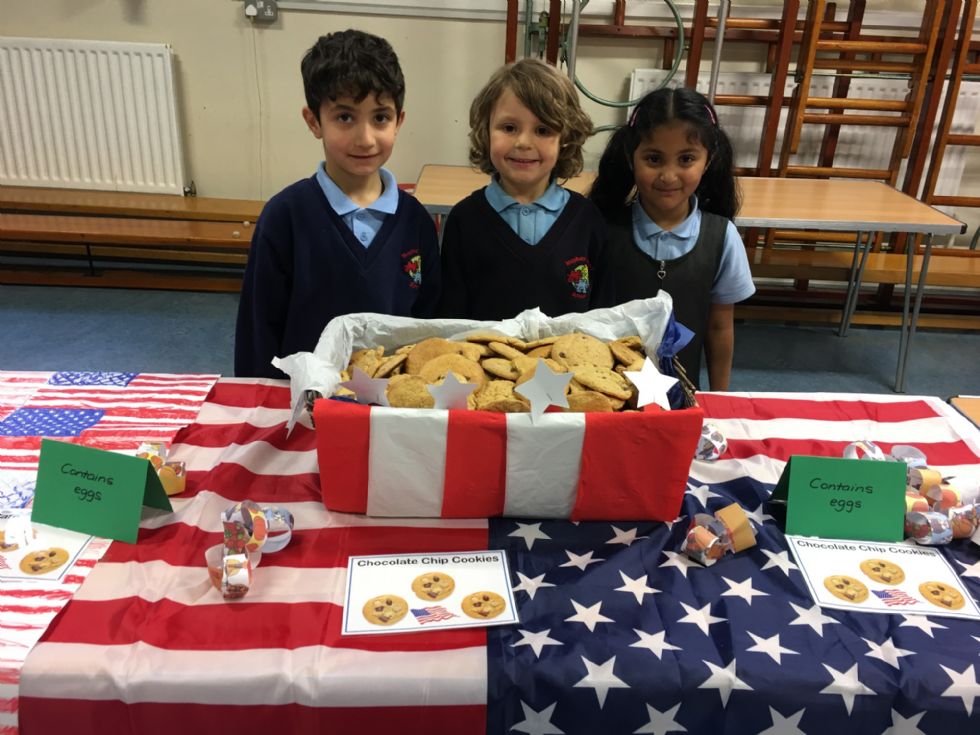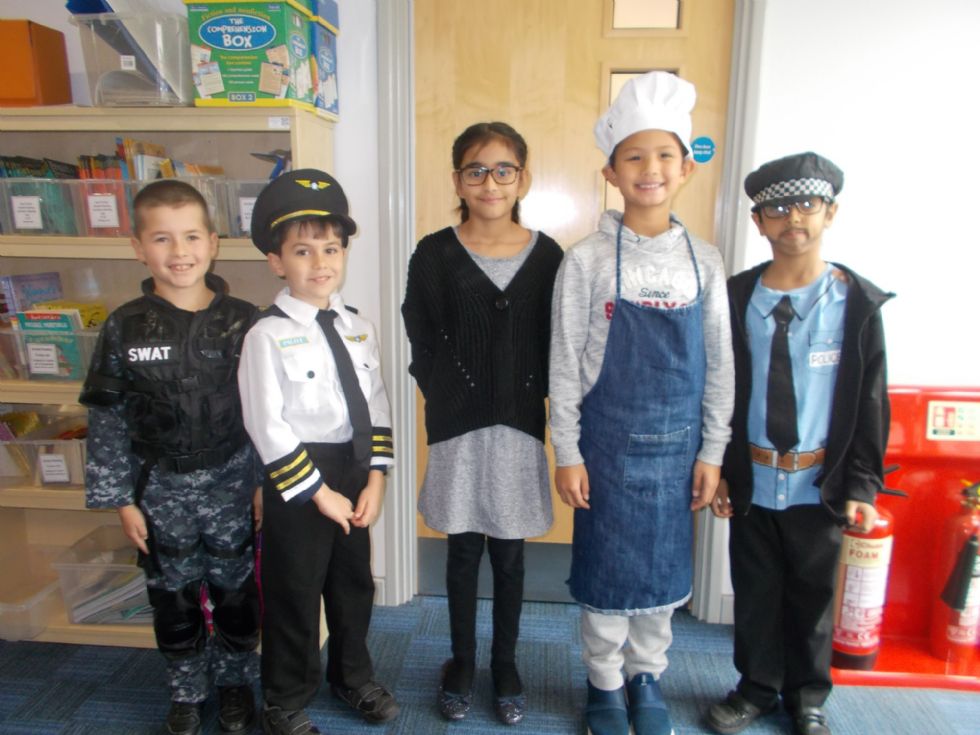Our Curriculum
Our vision at Maybury is...
We have uncompromising aspirations for all of our children. We are committed to providing an education and environment that enables every child to believe in their ability to succeed and excel in all that they do. We are proud to be a respectful and inclusive school at the heart of our culturally diverse community, where every child is valued and enabled to achieve their highest potential in all areas of the curriculum.
Our motto is Believe. Achieve.Succeed.
Our primary aim is to develop a love of learning through meaningful, engaging and creative learning experiences. We aspire to enable every child to become an active member of our school and the wider community. We celebrate diversity and teach our children that equality and respect are the foundations of our community. We pride ourselves on our Values Based Education which results in an inclusive, welcoming and caring ethos.
From the moment a child is born in the community, they can interact with the school staff and our curriculum starts the minute the children and their families set foot inside our school, for many of our children this is when they start in Nursery. We also work with our community to support children from the minute they are born though our community play and learn group. We understand the importance of a highly effective EYFS curriculum which provides all children with the skills and knowledge they need to ensure strong foundations are established for all future learning. Our curriculum is designed to build upon skills, knowledge and vocabulary children have learnt in the EYFS enabling children to know more and remember more.
Our intent is to provide opportunities for all of our children to become independent, confident learners with high aspirations, who know how to make positive contributions to the wider community. We want our pupils to be able to retain knowledge, widen their vocabulary and gain transferable skills to support their next steps in education ensuring all children are ready for the challenges that await them.
Our curriculum is ambitious and coherently planned and sequenced, children understand the purpose of their learning and are able to link new knowledge and skills to previous learning and experiences. We have an excellent knowledge of our children and their backgrounds. Our aim is to provide every child with the vocabulary, skills and knowledge they need to be successful. As the majority of our children have low start points in Communication and Language and speak English as a second language, language and communication development is a pivotal part of our rich language-based curriculum. For this reason, reading is at the heart of our curriculum. We are a school that prioritises reading, knowing that reading proficiency impacts on our pupils’ future success. Above all, we want our pupils to love to read.
As many of our children speak English as an additional language (EAL), we are acutely aware of the need to develop their spoken English in order for them to develop reading and writing skills. Therefore, we use a wealth of high-quality texts which offer the opportunity to learn new vocabulary, and which demonstrate English language structures. We have a strong emphasis on the importance of high-quality interactions providing opportunities to model spoken language as well as opportunities for children to talk throughout the curriculum. In our school language and communication takes place everywhere, all the time!
At Maybury, many of our children start school with limited experiences, so we construct a curriculum which provides a wealth of practical first-hand experiences including visitors, trips and workshops. We are therefore committed to broadening their world to provide them with the cultural capital they require to be successful, enabling them to Believe, Achieve and Succeed.
Values Education
Our curriculum is underpinned by a strong values-based ethos which helps our children understand about their responsibilities to themselves and others. We have high expectations of all our children and encourage them from the outset to be aspirational and self-reflective individuals. We aim to develop children’s sense of importance and belonging which is essential for building social relationships and for contributing to the world.
Our School Values are Equality, resilience, Positivity, Kindness, Respect and Independence. Throughout our curriculum we promote these life-long values to ensure:
Our children are ambassadors for equality for all
Our children have the resilience to succeed in all they do
Our children spread positivity
Our children will always choose kindness
Our children champion mutual respect for all
Our children develop independence to be self-reliant and self-sufficient
Implementation
Curriculum design
We implement this through consistent and effective Quality First Teaching delivered by highly trained staff. We deliver a curriculum which is designed to provide a broad and balanced education that meets the need of all children in the modern world. We provide a personalised curriculum which is heavily based on developing children’s communication skills particularly for SEND, new arrivals and children with English as an additional language. This involves clear language modelling and vocabulary development, and ensuring that they have access to the curriculum through translated resources, and bilingual staff.
The teaching of key vocabulary is a primary feature in all subjects through a range of strategies such as, precision teaching, pre-teaching and language modelling. The ethos of the school reflects our commitment to all children in an inclusive way, promoting the protective characteristics and which celebrates our rich diversity.
The school curriculum map is planned to ensure that teaching is sequential and that vocabulary, knowledge and skills are taught in a logical and progressive order. This ensures pupils will know more and remember more. Our lessons provide opportunities for retrieval practice and, over time, revisit teaching and knowledge of skills, knowledge and vocabulary. This enables children to build upon prior learning and the sequence of knowledge we have identified necessary for children to make god progress.
Teachers assessment effectively to help pupils embed and use knowledge and skills fluently. Through fast feedback we are able to provide children with immediate feedback which they act upon to make improvements to their learning.
At Maybury we have strategically planned our curriculum to meet the needs of our community. We believe that the topics we teach will enthuse and inspire our children, developing them as individuals to ensure they make excellent progress from their starting points. Our rich and vibrant curriculum aims to develop specific skills which can be seen across the school throughout all subject areas. As a team we have created long term plans which ensure progression of vocabulary, skills and knowledge within a context. teaching is carefully tailored to meet the needs to all children.
Writing
High quality texts are integral to our teaching of writing, together with a range of age specific resources and the use of technology. In year 1, children develop their writing skills through weekly cycles to exposure children to a rage of stories and language, developing their early writing skills and writing structures. From year 2, writing skills are developed in three-week cycles, providing the opportunity to embed vocabulary, develop language structures and refine pupils’ writing. Children are taught to plan, write, edit and publish their work. Children learn about a range of genres throughout the year. They focus on the key features for each genre and learn the skills to write in that particular genre. The different genres are then retaught throughout the school, ensuring that there is progression between the year groups and that each child can achieve their full potential. High quality written work is celebrated during our celebration assembly each week. Grammar, punctuation and spelling are intertwined into lessons.
Reading
Reading is at the heart of our whole curriculum. We recognise the foundations for teaching the English National Curriculum begin in Early Years with the development of a high quality programme planned within Communication, Language and Literacy. Many children enter our schools with very poor language skills, limited exposure to books, spoken English and opportunities to share stores. Therefore, teaching children to communicate and engage with stories is vital from the very early stages of their journey with us through primary school. As an inclusive school, our curriculum recognises the varied needs of our children and allows every child to maximise their learning potential and achieve. Our aim is to prepare them for the application of English Reading skills across the whole curriculum and life beyond education. We believe reading is a passport to the world and strongly feel that cultivating a “reading for pleasure” culture in our schools is imperative. Reading consists of two dimensions: word reading and comprehension. During our Cracking Comprehension sessions and Reading Roundabout sessions we teach explicit VIPERS skills. These reading sessions are separate from our Literacy lessons, although texts may complement literacy or another curriculum areas. During a typical Reading Roundabout session, the teacher will plan a guided reading session and independent activities that are linked to VIPERS skills. They will share which VIPER skill the children will be focusing on for that session, using displays to reinforce learning.
Speaking and Listening
At Maybury Primary, we believe that all our children can become clear, fluent and confident speakers. We provide a range of speaking and listening opportunities such as, drama, presenting, questioning and the use of ‘Talk Buddies’. Teachers use a range of strategies to encourage children to articulate their thinking and listen critically to others. As many of our children speak English as an additional language (EAL), we are addressing the deficit in their knowledge of English vocabulary. Staff are mindful of the correlation between a strong spoken vocabulary and achievement in Reading and Writing. ‘Word Aware’ and knowledge organisers are used to introduce new vocabulary and to develop our children’s understanding of what words mean.
Maths
Maths at Maybury provides a foundation for understanding the world; the ability to reason and problem solve mathematically, an appreciation of the beauty and power of mathematics, and a sense of enjoyment and curiosity about the subject.
There is a strong emphasis on Mastery, which means children having a secure understanding of mathematical concepts and processes, combined with a genuine procedural fluency. Children are able to apply their understanding of a concept in a wider variety of contexts, some of which are more difficult. They can manipulate the facts they know and the skills they possess in order to solve more complex problems.
At Maybury, there is an expectation that all children can succeed in maths, giving children a secure and sustainable understanding of mathematical concepts by using a CPA approach (Concrete, Pictorial and Abstract). Children who master a concept easily are expected to deepen their understanding, for example by applying it to solve problems embedded in mathematical investigations or more complex contexts. Children who do not master an objective with the rest of the class are supported to enable them to gain more experience and achieve mastery, for example through fast feedback (during lessons), same-day intervention(conferencing), plus longer-term help if necessary.
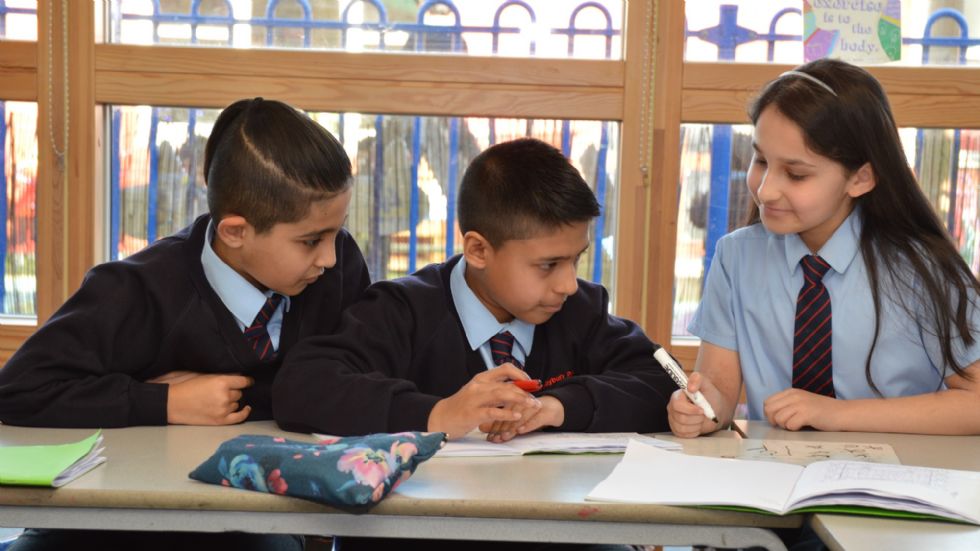
Science
At Maybury, we recognise the importance of Science in daily life. Science is taught in units laid out in the National Curriculum, and we use this to plan lessons and to ensure coverage and progression throughout school. We embed Scientific enquiry skills in each topic, as well as topic-specific vocabulary and opportunities to investigate. We want our children to believe that they can grow up to be scientists and inventors. We try to use our outdoor school environment where possible to support learning and plan a range of school trips and workshops throughout the year to bring Science to life and to provide first-hand experiences.
We aim for Science learning to increase children's knowledge and understanding of our world, and to develop skills associated with Science by exploring and talking about their own ideas, asking their own questions and solving problems, allowing every child to achieve their full potential. We strive to develop the natural curiosity of our children and encourage respect for living organisms and the physical environment. We aim to help children develop an understanding of key scientific concepts whilst engaging in meaningful enquiry, so that they may succeed in all areas of Science.
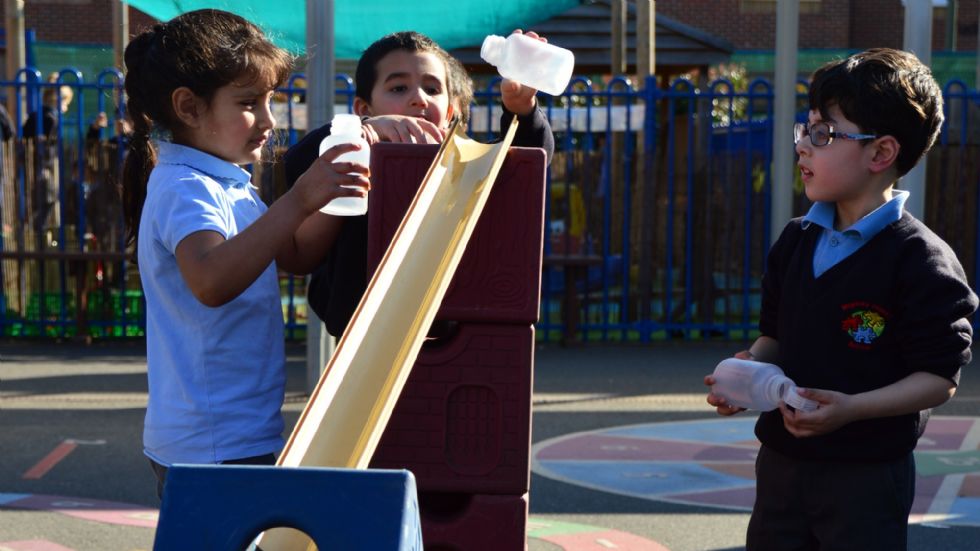
History
At Maybury Primary School, we believe that high-quality history lessons inspire children to want to know more about the past and to think and achieve as historians. By linking learning to a range of topics, children have opportunities to investigate and interpret the past, understand chronology, build an overview of Britain’s past as well as that of the wider world, and to be able to communicate historically. We aim to enable children to ask perceptive questions, think critically, weigh evidence, sift arguments and develop perspective and judgement. We endeavour to ensure all pupils succeed regardless of ability, every child can be an historian.
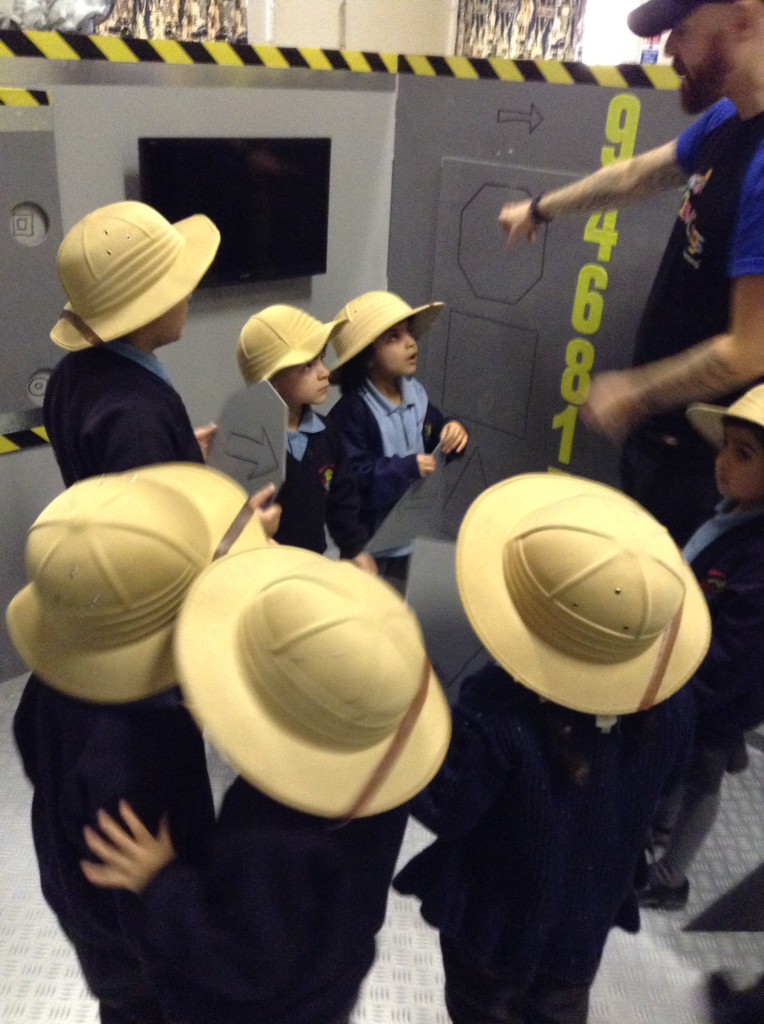
Geography
Our Geography curriculum is designed to develop children’s curiosity and fascination about the world and its people that will remain with them for the rest of their lives, to believe that they can have a positive impact on the environment around them. Children investigate a range of places – both in Britain and abroad – to help develop their knowledge and understanding of the Earth’s physical and human processes. We are committed to providing children with opportunities to investigate and make enquiries about their local area of Woking so that they can achieve of real sense of who they are, their heritage and what makes our local area unique and special. We are also developing the children’s ability to apply geographical skills to enable to confidently communicate their findings and geographical understanding to a range of audiences and succeed in becoming geographers.
Where possible, links are made to our local area during Geography lessons and our international week provides the children with a rich understanding of a range of different cultures and traditions. Our four areas of focus are for children to develop their: contextual world knowledge, geographical understanding, geographical enquiry and mapping skills.
Modern Foreign Language
At Maybury we aim to provide all of our children with a high-quality education in Modern Foreign Languages (MFL), which develops their love of learning about other languages and cultures. Currently, we teach all children in Key Stage 2 French, however we strive to provide children with opportunities to experience a range of other languages with so many of our learners already speaking another language. In Key Stage 2, children will begin to learn French as an introduction to modern language with a high focus on oral spoken language. We believe that through these lessons the children will make grammatical links with the English language, build a French vocabulary and will learn about French culture and traditions allowing them to achieve an understanding of both spoken and written French and succeed, knowing the importance of languages in their future.
Computing
At Maybury we understand that technology is everywhere and will play a pivotal part in pupils' lives. We want to model and educate our pupils on how to use technology positively, responsibly and safely. We want them to believe they can have a positive impact online. We want our pupils to be creators not consumers and our broad curriculum encompassing computer science, information technology and digital literacy reflects this allowing every child to achieve their full potential. We want our pupils to be fluent with a range of tools to best express their understanding and hope by the end of KS2, children have the independence and confidence to choose the best tool to succeed at tasks and challenges set by teachers.
At Maybury, we follow the objectives from the Teach Computing scheme of work to ensure full coverage of the National Curriculum. Children have shared access to a range of hardware to support computing teaching including Chromebooks, iPads, BeeBots, LEGO WeDo sets, headphones and we hire out VR headsets and micro:bits to enhance learning and engagement in computing further. The school uses a range of software to deliver the computing curriculum including online paint apps, Jamboard, scratch Jnr, scratch, Chrome Music Lab, j2data, pixlr, canva, stop motion app and BandLab.
We also deliver online safety sessions half termly to the children in each year group alongside termly assemblies for KS1 and KS2. EYFS use story books with the children to ensure they are being taught about staying safe online as soon as they arrive at our school. Through our computing curriculum, children show that they are enthusiastic and confident in their approach towards Computing. They are able to identify the source of problems and work with perseverance to ‘debug’ them and are able to create and evaluate their own project work.
Physical Education
At Maybury, PE provides pupils with the opportunity to learn how to be successful participants in physical activity. It allows pupils to understand what physical activity looks and feels like and how, with practice, believe they can improve their skills sets to reach high quality outcomes.
All children are provided with opportunities in lessons to practise skills for the following sports: netball, football, gymnastics, tag rugby, dance, hockey, orienteering cricket and athletics. In KS1, we work on developing core skills such as throwing, catching and agility. They also start to develop working as a team and supporting each other. In lower KS2, we develop these core skills further and embed them more within specific sports but in skill-based lessons. In upper KS2, we embed the social side of PE with good sportsmanship and having more opportunities for competition within lessons to apply their skills to games. By the time pupils reach upper KS2, they will have a deep and varied PE experience. They will be able to call upon an extensive range of skill and link these together to achieve more complex movements and tasks. They will be able to apply tactical and strategical thinking in a range of contexts. Furthermore, we want the children to apply key values to their sport, such as respect and fairness to succeed at becoming sportsmen and sportswomen. We have strong links with teachers at our local secondary school, who support and extend our teaching of physical education, who teach P.E at Maybury every Wednesday, providing high quality CPD for teachers. We offer a range of sporting clubs, some lead by our staff and others coached by outside sports providers.
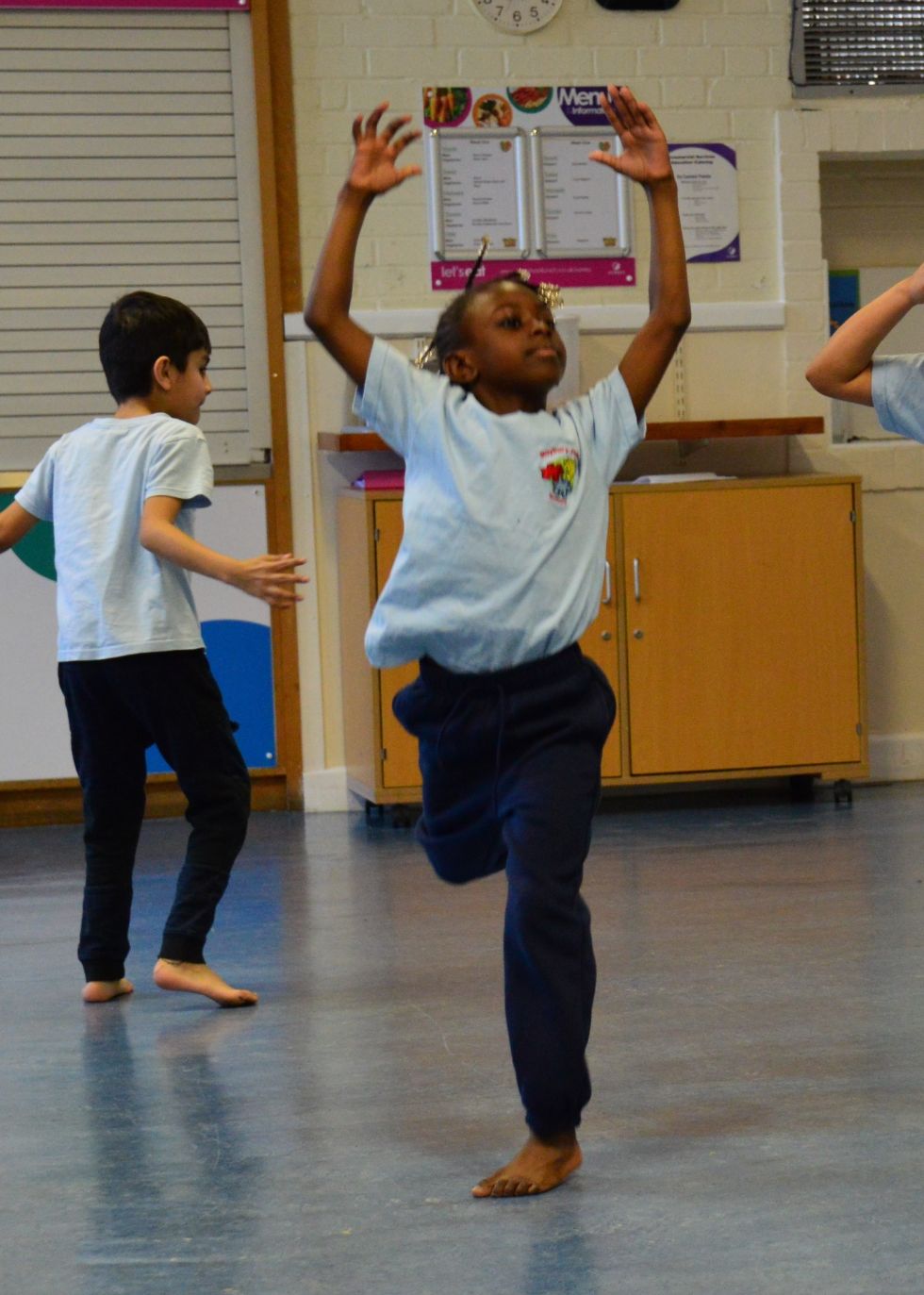
Religious Education
At Maybury we follow the Surrey Agreed Syllabus. We believe that Religious Education is an essential component of a broad and balanced education. Religious Education is concerned with the deep meaning that individuals and groups make of their experiences and how this helps them give purpose to their lives. It provides opportunities to explore, make and respond to the meanings of those experiences in relation to the beliefs and experiences of others as well as to one's own experiences. It is the aim that the teaching of Religious education at Maybury is of a high standard which helps to promote pupils' spiritual, moral, social and cultural development and to prepare all pupils for the opportunities, responsibilities and experiences of the present and the future, allowing them to achieve their full potential. A main aim of RE is to develop tolerance and respect within our pupils allowing them to succeed beyond Maybury Primary School.
The main impact of effective RE at Maybury, is that our pupils can make sense of the world and their place in it, it encourages our children can connect learning from different religious and non-religious views. The aim of RE is to develop tolerance and respect – this is clearly achieved and is evident when you meet and talk to our pupils.
Learning for Life
At Maybury, we are committed to providing our pupils with a high-quality Learning for Life curriculum which underpins the values of our school. Our curriculum brings together citizenship with personal well-being whilst promoting British values, alongside our school values. We want our pupils to become responsible citizens who believe they can make a difference within our school, community and the wider world. We encourage our pupils to think critically and ask questions about the world around them providing opportunities for them to create change. Our curriculum aims for pupils to understand how they are developing personally and socially and tackles moral, social and cultural issues that are part of growing up. We provide opportunities to learn about rights and responsibilities, appreciating what it means to be part of a diverse society. Our Learning for Life curriculum ensures all children achieve a sense of self-worth by playing a positive role in contributing to school life and the wider community. We aim for our pupils to leave Maybury knowing they can succeed at anything they put their mind to.
We deliver Learning for Life using the Jigsaw PSHE scheme of work to ensure full coverage of the National Curriculum. Jigsaw takes a mindful and child centred approach. Jigsaw integrates personal, social, health and economic education. It places an emphasis on emotional literacy, mental health and Spiritual, Moral, Social and Cultural education (SMSC.) Lessons help children know and value who they are and how they relate to other people, in an ever-changing world.
Music
At Maybury we believe children should be exposed to different genres of music and have the opportunity to participate in music through listening and appraising, singing, playing an instrument, composing and performing while exploring pulse, rhythm, pitch, tempo, dynamics, timbre, texture, structure and notation. These elements are at the centre of all music learning at Maybury.
Music is taught through Charanga, a scheme of work which provides a steady progression plan, both within each year and from one year to the next, ensuring consistent musical development. By using Charanga as the basis of a scheme of work, we can ensure that we achieve the aims for musical learning stated in the National Curriculum:
Our children are exposed to many examples of music styles and genres from different times and places. These are explored through the language of music via active listening, performing and composing activities, which enable understanding of the context and genre.
Children are actively involved in using and developing their singing voices, using body percussion and whole-body actions, and learning to handle and play classroom instruments effectively to create and express their own and others’ music. Through a range of whole class, group and individual activities, children have opportunities to explore sounds, listen actively, compose, perform and succeed.
Within our curriculum we study 6 aspects:
- play and perform in solo and ensemble contexts, using their voices and playing musical instruments with increasing accuracy, fluency, control and expression
- improvise and compose music for a range of purposes using the inter-related dimensions of music
- listen with attention to detail and recall sounds with increasing aural memory
- use and understand staff and other musical notations
- appreciate and understand a wide range of high-quality live and recorded music drawn from different traditions and from great composers and musicians
- develop an understanding of the history of music.
All children at Maybury Primary School have opportunities to learn and perform musical instruments, these include untuned instruments as well as tuned instruments such as the recorder and the glockenspiel. In addition to our weekly music lessons, we have weekly singing assemblies and workshops to enhance our curriculum. The children also have opportunities to perform during class assemblies, Christmas concerts and when singing at the local care homes. Our talent competition "Maybury’s Got Talent" is always a popular finale to our year when children can perform and celebrate their musical abilities.
Art
At Maybury we believe that pupils should be exposed to a broad range of different kinds of arts, craft and design. They should be able to think critically about art and design, including their own.
Children will develop their understanding of the visual language of art, and the visual elements of art and design (line, tone, texture, colour, pattern, shape, 3D form) and these are developed by providing a curriculum which enables children to reach their full potential. As children progress through each year group, they will develop their techniques and have the opportunity to apply these creatively with no ceiling on what they can achieve. The teaching and implementation of our Art and Design Curriculum at Maybury Primary is based on the National Curriculum, we ensure a well-structured approach to this creative subject where all children can succeed. Producing ‘art’ at Maybury is like going on a journey where children have opportunities to explore techniques and materials, learn and practise new skills through mimicry and looking at the work of artists. The outcome is unique for each child where they are able to be independent and make their own choices.
5 Stages of the ‘Art Journey.’
- Observation/research
- Explore (teaching of a technique)
- Mimic the style/technique
- Try different media
- Unique – produce own work in the style of an artist or using new techniques/skills taught.
The skills, knowledge and key vocabulary that children will develop throughout each art unit are mapped across each year group and throughout the school to ensure progression. The emphasis on knowledge ensures that children understand the context of the artwork, as well as the artists that they are learning about and being inspired by. This enables links to other curriculum areas, with children developing a considerable knowledge of individual artists as well as individual works and art movements. A similar focus on skills means that children are given opportunities to express their own creative imagination, as well as practise and develop mastery in the key processes of art: drawing, painting, sculpture as well as printing and collage. From Year 1, our children are provided with a sketch book in which they can explore, mimic and practise new skills and produce their own work.
Local artist studies, trips and workshops ensures that art is given high status in the curriculum. The school takes part in ‘Station Art’ which enables us to showcase our artwork within our local community for all to enjoy and celebrate.
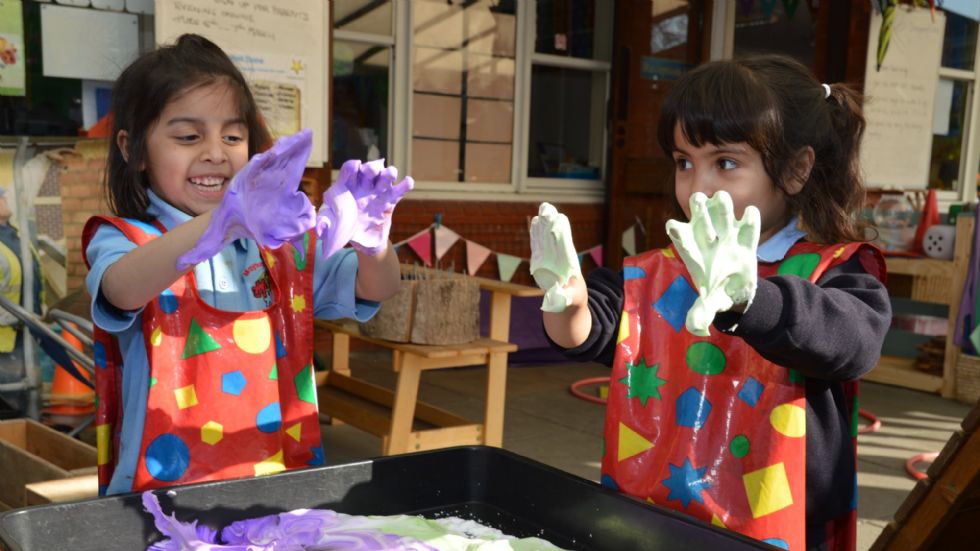
Design Technology
At Maybury we believe Design Technology is a key part of our broad and balanced curriculum. It is our intent for Design Technology to offer children the chance to use creative thinking and design within a defined purpose and tangible outcome. Through a variety of creative and practical activities, pupils at Maybury are taught the knowledge, understanding, skills and vocabulary needed to achieve a process of designing and making. At Maybury DT is carefully planned through the use of 6 key principles to allow all pupils to succeed.
These are:
- User - Pupils should have a clear idea of who they are designing and making products for
- Purpose - Pupils should be able to clearly communicate the purpose of the products they are designing and making
- Functionality - Pupils should design products that work/ function effectively to fulfil users' needs
- Design Decisions - Pupils need opportunities to make their own design decisions
- Innovation - When designing and making pupils need some scope to be original with their thinking
- Authenticity - Pupils should design and make products that are believable, real and meaningful to themselves and others
Key skills, knowledge and vocabulary for DT have been mapped out across the school to ensure progression between year groups and to ensure complete coverage of the National Curriculum. This also ensures that there is a context for the children’s work in Design and Technology; that they learn about real life structures, mechanical systems, textiles and cooking and nutrition and the purpose of specific examples. Children learn how to take risks, becoming resourceful innovative, enterprising and capable citizens. Through the evaluation of past and present design and technology products, the children at Maybury develop a critical understanding of its impact on daily life and the wider world.
Accessibility and Support
At Maybury, we believe that all children are entitled to a broad, balanced and relevant curriculum which we achieve through high quality, adaptive and responsive teaching, pre-teaching of vocabulary, targeted interventions and strategically scaffolded learning. We have high expectations of all our learners and strive to provide them all with an appropriate level of challenge to help them succeed in their learning
Our experienced staff use their expertise to skilfully scaffold and support children’s learning across all curriculum areas. Children are carefully observed and assessed at ongoing and regular intervals to ensure that the learning opportunities we provide are relevant and responsive to individual needs. We utilise a number of targeted interventions and adaptations to the curriculum in order to present our children with additional challenges or support as appropriate.
We believe that most children learn best in their classroom alongside peers and with their teacher. With this in mind we aim to provide a range of adaptations to the classroom environment and the curriculum to allow this to happen. There are some occasions where trained staff may deliver time bonded and specific interventions to groups or individuals outside of the classroom. These focused interventions include: Reading Recovery, TalkBoost 2 , Early Literacy Support (ELS) and other literacy interventions using Fischer Family Trust materials as well as individual programmes of support. We also utilise a range of web based support through online learning platforms such as Lexia.
Staff regularly work with link professionals such as speech therapists, educational psychologists or specialist teachers to receive training which enables them to support the specific needs of individual pupils.
Parental Involvement
We value and encourage parental involvement and the benefits this has for children’s learning and development. We fully support our parents through focused parent workshops where we model how we teach children and show parents how they can best promote their child’s learning in specific areas. We work with local agencies to run classes for parents such as English classes.
We hold regular parent/teacher meetings to inform parents about their child’s progress and to share individual targets. In between these times, parents are encouraged to come into school for half termly parent drop ins to look at books and talk to the class teacher in a more informal setting, we promote an open door policy. We also open up our library for parents and children to enjoy once a week in the Starbooks Café session. We are also fortunate to have a full time, bilingual, home/school link worker who works closely with our families. In addition, we run half termly parent workshops for parents to support their understanding of their children’s learning, our school initiatives and how we can work in partnership to support this. This also helps parents to create useful support networks with each other.
We run targeted parent projects focusing on identified areas which we want to develop with individuals and focus groups, these sessions are for parents and children to work together. In the past this has included projects using first language experience to enrich learning, promoting learning for our disadvantaged pupils and supporting children’s mental health.
Our Home School Link Worker works on a daily basis to develop communication with our parents and to signpost them to further support. This is an essential part of building parents trust and cooperation in our school.
Impact
The impact of this is that children make excellent progress from their start points, and are immersed in a broad and balanced skills-based curriculum- facilitating them with the knowledge and vocabulary that they need for the next stage of their learning journey and for life.
